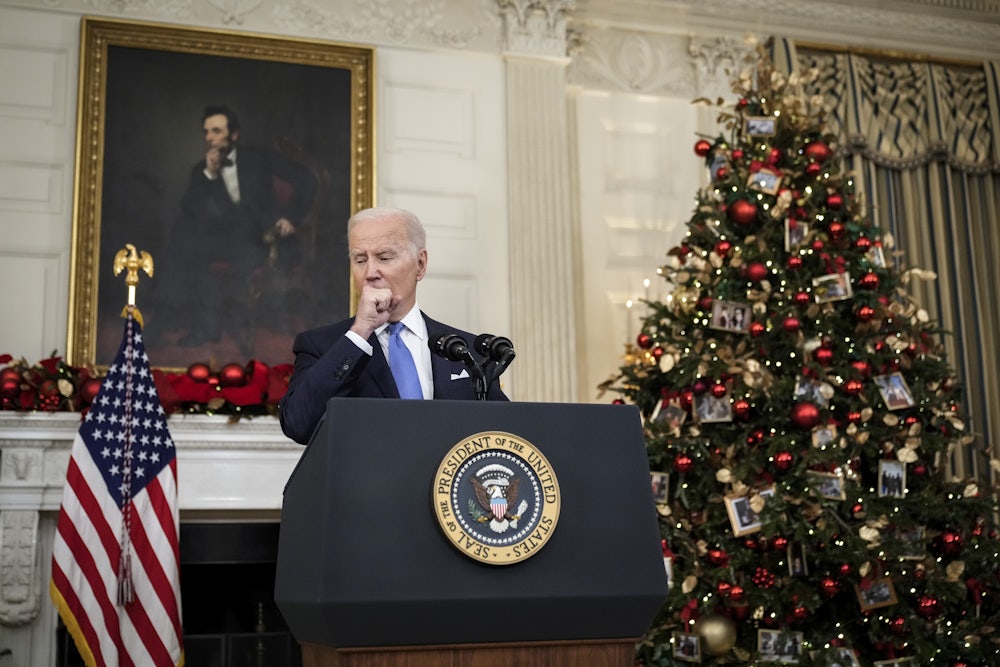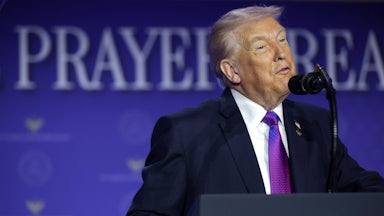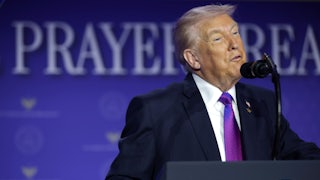Aside from wartime, it is rare—if not unprecedented—for a president to utter words as blunt as Joe Biden’s message Tuesday afternoon to the unvaccinated. “You’re putting other people as risk,” the president said with a tinge of anger in his voice. “Your loved ones, your friends, neighbors, strangers you run into. And your choice can be the difference between life and death.”
Almost all Americans, Biden included, had hoped and prayed that we would no longer be talking in such apocalyptic terms almost two years into the pandemic. But no one, other than worried epidemiologists, anticipated the speed with which the omicron variant would overrun the Christmas season.
So Biden, in his latest Covid-19 speech, was forced to confront the darkest fears of all—that this was a replay of the frightening early days of the pandemic when the wail of ambulance sirens became the sound of America. “No, this is not March of 2020,” Biden declared. “Two hundred million people are fully vaccinated. We’re prepared. We know more. We just have to stay focused.”
The problem with Biden’s speech was not his words, but his audience.
The Americans most in need of hearing his urgent plea for vaccinations and booster shots were probably the least likely to tune in on a Tuesday afternoon. A mid-December Axios poll found that only 15 percent of Americans possess “a great deal” of confidence in Biden as a messenger on the pandemic and another 29 percent have a “fair amount” of confidence in the president. That means that for more than half the nation, the president’s words are little more than background noise.
Biden, despite a slightly unnerving cough, valiantly tried to cut through the fog of distrust. In some of the strongest words of his presidency, he denounced the “dangerous misinformation on cable TV and social media.” You could envision Tucker Carlson and the rest of the Fox News evening lineup as Biden said, “These companies and personalities are making money by peddling lies and allowing misinformation that can kill their own customers and supporters. It’s wrong. It’s immoral.”
Taking his allies where he could find them, Biden pointedly noted, “Former President Trump announced he had gotten his booster shot. Maybe one of the few things he and I agree on.” Grabbing another olive branch, the president even went out of his way to praise “the prior administration” for helping America become one of the first countries to get the vaccine.
Of course, we squandered that initial advantage because of right-wing conspiracy theories and vaccine hesitancy. A new survey from the KFF Covid-19 Vaccine Monitor found that more vaccinated (52 percent) than unvaccinated Americans (42 percent) worry about personally getting sick from the coronavirus. What does it say about the decline of rationality that the unvaccinated appear to be living in a bubble of sublime confidence that they are too patriotic and too God-fearing ever to get sick?
Other than Biden, no president has ever consistently tried to explain a pandemic and its accompanying risks to the American people. (A century ago, Woodrow Wilson never even mentioned the influenza epidemic, despite the terrible carnage.) That is why I am somewhat hesitant to critique the omissions in his White House address.
Still, in an ideal world, the president would have made clear to the skeptical that the science surrounding Covid-19 is constantly evolving based on new information. That is why booster shots are now needed to augment the initial doses of the Pfizer, Moderna, and Johnson & Johnson vaccines. The fear, though, is that the changing rules on the number of jabs needed will further undermine the credibility of Biden and the government as reliable sources of information about the pandemic.
Biden did the right thing is stressing that closing public schools is no longer a reasonable strategy. But, again, Biden could have gone further in acknowledging that state and local officials—out of both fear and ignorance—went too far in depriving students of more than a year of in-person education.
The weakest part of Biden’s presentation was the president’s defensiveness about the current shortage of at-home Covid tests. Biden boasted, “I’m announcing today that the federal government will purchase one half-billion—it’s not million, it’s billion with a b—additional at-home rapid tests, with delivery starting in January.”
The key word in Biden’s sentence, of course, is January, long after the holiday season’s current nervousness about travel and reuniting with family. The test shortage is not just in the overvaccinated Northeast and on the West Coast. The Kansas City Star, for example, reported Tuesday, “You can still find at-home tests at some stores and pharmacies across the metro. But due to high demand, they’re flying off the shelves.”
At an impromptu press conference after his speech, Biden was challenged over the lack of at-home tests, especially since they are cheap and plentiful in Europe. The president, in less than convincing fashion, blamed the rapid spread of the omicron variant for the test shortage: “We had a lot of people who have access to tests order them.… All of a sudden, it was like everyone rushed to the counter.”
The demands on Biden to be both reassuring and firm in the face of a chilling crisis are greater than most presidents ever face. It is hard to find anything comparable during the tenure of either Barack Obama or Bill Clinton. But Covid-19—and Trump’s flailing in the face of it—is what elected Biden president. And if the nation weathers this storm, taming the pandemic will be the most glittering achievement of the Biden presidency.
Here’s hoping for an infinitely less frightening 2022.






